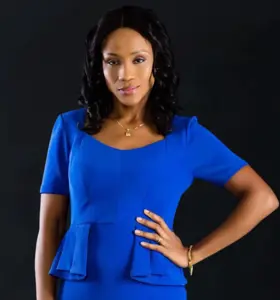

Leading expert in office politics and women leadership. Helping teams and organisations navigate within strategy, leadership, and culture.
Why you should book Niven Postma for your next event
- Her keynotes on organisational politics, leadership, culture and women’s leadership have been delivered to audiences of up to 60,000 people.
- Niven has served as Reserve Police Officer for 2 years and is Chairperson of the Board at Cotlands.
Non-binding request for Niven Postma
Niven Postma: Strategy, leadership and culture facilitator - developing meaningful strategies.
Niven is a strategy, leadership and culture consultant partnering with clients in diverse industries around the world, to (re)ignite the discretionary energy of people and teams, build an enabling culture and develop meaningful strategies.
An expert in organisational politics, Niven is the author of the best-selling book If you don't do politics, politics will do you - A guide to navigating office politics ethically and successfully (published in 2020). Her articles and ideas can be found in various well respected media and podcasts. Niven is a Harvard Business Review contributor and a visiting lecturer at Henley Business School.
An expert in organisational politics, Niven is the author of the best-selling book If you don't do politics, politics will do you - A guide to navigating office politics ethically and successfully (published in 2020). Her articles and ideas can be found in various well respected media and podcasts. Niven is a Harvard Business Review contributor and a visiting lecturer at Henley Business School.
Niven has had a wide and varied executive career across multiple organisations and sectors, including CEO of the Businesswomen’s Association (BWA), CEO of NOAH (Nurturing Orphans of AIDS for Humanity), Head of External Strategy and Head of the SARB Academy at the South African Reserve Bank, and Head of Leadership and Culture for the Standard Bank Group.
Niven is a Doctoral student and holds an Executive MBA in Systems thinking, Human capital development, knowledge management, leadership and change. She also holds a Postgraduate Diploma in Future Studies and a BA in English Political Science. Niven has been awarded with the Archbishop Tutu Leadership Fellowship in 2007.
She lives in Johannesburg with her partner and gets to be the proud and happy aunt to 6 niblings in South Africa, Kenya and New Zealand.
Niven is a Doctoral student and holds an Executive MBA in Systems thinking, Human capital development, knowledge management, leadership and change. She also holds a Postgraduate Diploma in Future Studies and a BA in English Political Science. Niven has been awarded with the Archbishop Tutu Leadership Fellowship in 2007.
She lives in Johannesburg with her partner and gets to be the proud and happy aunt to 6 niblings in South Africa, Kenya and New Zealand.

Keynotes
Keynote by Niven Postma:
IF YOU DON’T DO POLITICS, POLITICS WILL DO YOU…
Anything complex will always have more than a single story, but all too often we fall into the trap of the one dimensional, because it doesn’t even occur to us to look for more.
Exactly the same is true when it comes to office politics. There is so much more to office politics than the single negative and destructive story that we hear and tell ourselves.
This practical and eye-opening keynote is based on my recent book and draws on my 20 year experience as an executive, together with insights from some of the leading business thinkers of our time, It will open your eyes to the real definition of office politics, convince you that it’s possible to play politics without sacrificing your principles and teach you how to use politics to advance your career and build your organisation.
Exactly the same is true when it comes to office politics. There is so much more to office politics than the single negative and destructive story that we hear and tell ourselves.
This practical and eye-opening keynote is based on my recent book and draws on my 20 year experience as an executive, together with insights from some of the leading business thinkers of our time, It will open your eyes to the real definition of office politics, convince you that it’s possible to play politics without sacrificing your principles and teach you how to use politics to advance your career and build your organisation.
Keynote by Niven Postma:
PARADIGM SHIFT: Curiosity, Resilience and Leadership in an Era of Disruption
Year after year, Gallup’s Global Employee Engagement Survey shows that, irrespective of company, industry or country, more and more employees are disengaged. And yet, studies have shown that upwards of 80% of adults would want to work even if they financially didn’t need to.
Which for Niven, begs some questions: How conscious are each of us being in our career and life and the choices we are making in both? As a leader, can I honestly say that I am creating environments in which people grow, and feed their need to contribute? Or are they just dying a slow death every day that they drag themselves to work?
It is time for a paradigm shift where leaders encourage curiosity, nurture resilience and disrupt their industry. It is time for people to continuously acquire new skills and unlearn past routines. And it is time for organisations to understand the importance of a culture that allows for great things to happen.
Which for Niven, begs some questions: How conscious are each of us being in our career and life and the choices we are making in both? As a leader, can I honestly say that I am creating environments in which people grow, and feed their need to contribute? Or are they just dying a slow death every day that they drag themselves to work?
It is time for a paradigm shift where leaders encourage curiosity, nurture resilience and disrupt their industry. It is time for people to continuously acquire new skills and unlearn past routines. And it is time for organisations to understand the importance of a culture that allows for great things to happen.
Keynote by Niven Postma:
WOMEN’s LEADERSHIP – From systems & views to actions
Sexism and racism are systems and world views rather than (only) individual actions. As such, I think we miss a big part of the point when we focus only on women executives and the challenges that they face rather than starting right at the beginning to understand some of the challenges that all girls and women face in society.
“Invisible Women” by Caroline Criado Perez is a superb book, which has deservedly won a number of major prizes, including the 2019 Financial Times and McKinsey Business Book of the Year, for what the judges recognised were “unassailable facts backed by powerful stories.” In the book, she speaks of the massive gender data gap that exists in the world around women’s experiences, because we live in a world that is largely built by, and for, men. This gender data gap affects three critical aspects with regards to women’s experiences all around the world.
The first thing it affects is the female body. The second is women’s unpaid care burden. And the third aspect is male violence against women, including the disproportionate impact that war and conflict have on women. That said, even in ‘peaceful societies the scourge of domestic violence is always present and worsens at times of economic difficulties.
These issues don’t stop affecting women just because they are executives. So while executives may have more resources with which to cope with some of them, they are still part of the system that all human beings all live in.
For organisations and the women in them to thrive, we need to acknowledge and understand these things far better than we currently do. This is neither about ‘fixing’ women nor ‘blaming’ men but rather understanding the two kinds of risk we face if we don’t – the risk that bad things will happen and the risk that good things will not.
“Invisible Women” by Caroline Criado Perez is a superb book, which has deservedly won a number of major prizes, including the 2019 Financial Times and McKinsey Business Book of the Year, for what the judges recognised were “unassailable facts backed by powerful stories.” In the book, she speaks of the massive gender data gap that exists in the world around women’s experiences, because we live in a world that is largely built by, and for, men. This gender data gap affects three critical aspects with regards to women’s experiences all around the world.
The first thing it affects is the female body. The second is women’s unpaid care burden. And the third aspect is male violence against women, including the disproportionate impact that war and conflict have on women. That said, even in ‘peaceful societies the scourge of domestic violence is always present and worsens at times of economic difficulties.
These issues don’t stop affecting women just because they are executives. So while executives may have more resources with which to cope with some of them, they are still part of the system that all human beings all live in.
For organisations and the women in them to thrive, we need to acknowledge and understand these things far better than we currently do. This is neither about ‘fixing’ women nor ‘blaming’ men but rather understanding the two kinds of risk we face if we don’t – the risk that bad things will happen and the risk that good things will not.
Keynote by Niven Postma:
Managing Disruption in the Now Normal
With the ever-increasing rate of change that we are all dealing with, individuals, organisations and leaders all need to become better equipped to deal with what is our “now normal”; a disruption that will continue for years to come and unfold in many ways that for now we can only guess at.
In this disruption, we will undoubtedly be confronted with many more challenges but so too will we have many more opportunities – opportunities for growth, learning, collaborating and doing what really matters.
In this disruption, we will undoubtedly be confronted with many more challenges but so too will we have many more opportunities – opportunities for growth, learning, collaborating and doing what really matters.








